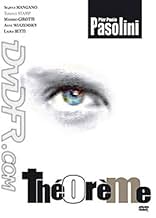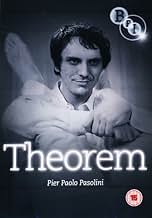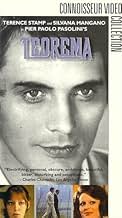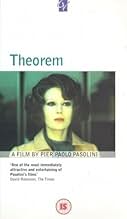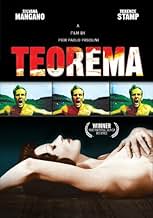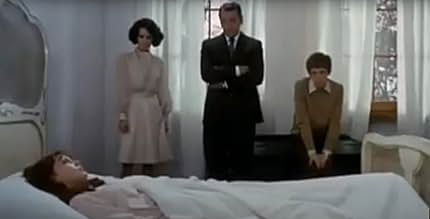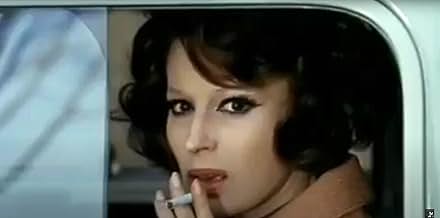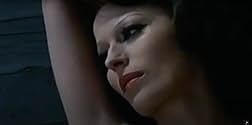A mysterious young man seduces each member of a bourgeois family. When he suddenly leaves, how will their lives change?A mysterious young man seduces each member of a bourgeois family. When he suddenly leaves, how will their lives change?A mysterious young man seduces each member of a bourgeois family. When he suddenly leaves, how will their lives change?
- Director
- Writer
- Stars
- Awards
- 1 win & 5 nominations total
- Second Boy
- (as Ivan Scratuglia)
- Interviewer
- (uncredited)
- Old Peasant
- (uncredited)
- Director
- Writer
- All cast & crew
- Production, box office & more at IMDbPro
Featured reviews
An Insightful, Important (but flawed) Film
The Bourgeois self-implodes
The family without a surname is led by Paolo (Massimo Girotti), the owner of a factory whose decision to give his industrial center to his workers is the subject of the opening of the film, a documentary-like interview with labor leaders from the factory who refuse to give any credit to their bourgeois boss, even as he does things that they want like devolve ownership to the workers, the interviewer asking if the bourgeois can never do anything good while the labor leader insists that it's only a ploy to make everyone bourgeois and avoid class conflict and warfare (communists are so...tiresome).
Where this actually happens in the story is unclear, actually, but the meat of the film is about the Visitor (Terrence Stamp), a young student known by Paolo's son Pietro (Andres Jose Cruz Soublette) who invites the Visitor to spend time at the large house the family calls home. The Visitor barely speaks, merely having a fascinating presence (the casting of Stamp is one of the best decisions in the film) and the showing of erotic but surrealist art to Pietro, awakening something within him. This awakening extends to Pietro's sister Odetta (Anna Wiazemsky), the mother Lucia (Silvana Mangano), as well as the maid Emilia (Laura Betti). The awakenings are mostly sexual in nature, though the Visitor's awakening of Paolo, while physical, is more therapeutic than sensual.
What is the Visitor? Honestly, this is one of those questions I never care about. I leave it as he's some kind of disruptive force who sweeps through the house and then leaves like a season or a storm. Is he angelic? Is he demonic? That's a level of symbolic reading that never interests me. The point is the effect, though, and the effect is what's interesting. This bourgeois family, living lives so empty of meaning, are completely thrown into chaos with the introduction of one outside element that shows them more than the pristinely curated view of the world they've known. It's a common critique of the bourgeois from leftist sources. It never strikes me as terribly realistic or insightful, but I think this film is helped by the fact that it's less strictly realistic and more purely metaphorical in intent. That creates emotional distance that something like Accattone was able to engage in, but the movement is still interesting.
The Visitor simply leaves the family, and the family reacts badly in different ways. Pietro leaves the family to become an artist (including pissing on a blue canvas because that's what he needs to do to recreate the presence of the Visitor, obviously something Pasolini did not find beautiful in its own right, making it fairly clear that he does not see this opening of the eyes purely good, probably because this bourgeois family is so unconnected to the world that they don't know how to process it). Odetta becomes completely catatonic. Lucia prowls the streets for random sex from young strangers who mostly remind her of The Visitor. Lucia becomes an ascetic who returns to her rural community, remains seated in one place drinking nothing but nettle soup, and then becomes some kind of holy figure climbing to the top of a building and floating in the air to the amazement of those around her. Paolo has a complete breakdown (it's very possible his giving away of the factory actually happens here), and he strips naked in Termini station before finding himself on the slopes of Mount Etna.
What does all of this mean? It means that Pasolini was a Marxist who hated the bourgeois and found them ridiculous, disconnected, and hopeless. Honestly, it's not the most interesting message because it's so rote. However, the delivery is what carries it. Pasolini had become known for his worldly, wordy films that used common Italian dialects instead of the Florentine while filming naturalistically (on the surface in the style of Italian neo-realism, but he wouldn't agree that he fell into that categorization), and here, in Teorema, he presents this theory of his on the bourgeois surrealistically and quietly. It's a distanced portrait of a family of four breaking down, and the actual steps of everyone's movements are interesting to me, even if the subtext ends up feeling shallow.
It's not one of Pasolini's great films, but I find Teorema to be something I can't quite ever take my eyes off of. I've actually seen it twice now, and I do appreciate it for its oddball portrait of a family in disarray towards destruction.
Teorema and Apartment Zero
Strange Metaphoric Movie
There's something haunting about "Teorema"...
A beautiful and enigmatic visitor (a young Terence Stamp, one of the intriguing, almost androgynous cult sex figures of the 60's, along the lines of a Udo Kier and others) seduces and then leaves each member of a bourgeois family. The father (Massimo Girotti, of Visconti's "Ossessione"), the mother (Silvana Mangano, "Death in Venice"), the daughter (Anne Wiazemsky, of Bresson's "Au Hasard Balthazar" and Godard's then wife), the son (Andrés José Cruz Soublette) and even the housemaid (Laura Betti, best actress at the Venice Film Festival for this performance) are all altered by the visitor's sexual presence in their lives, and each will try to find salvation or catharsis once they're abandoned. Their ways can be seen as an allegory of the fears and misconceptions of those trapped in their own conventions, and the tragic consequences of their failed attempts to get away - after the visitor, an hedonistic angel of death, tricked them with false hopes of sexual and emotional liberation. At least, that's how I see it - which I wouldn't dare to claim as an ultimate view on it. As enigmatic and haunting the images in "Teorema" are, they ask for repeated viewings. And just the fact that they give you enough interest for a second look, it's quite a feat. An interesting, cerebral cinematic exercise, to say the least. 8.5/10.
Did you know
- TriviaAt the 1968 Venice Film Festival, the film was given an award by the International Catholic Film Office. The award was withdrawn after critical remarks by Pope Paul VI. After the festival the film was confiscated by Italian police and Pier Paolo Pasolini charged with obscenity, but acquitted.
- GoofsWhen Lucia (the mother) leaves the house to go cruising for men, she is wearing a white coat. The first camera shots of her in the car also show the coat. However when she spots a young man and stops the car, the white coat is gone and now she's wearing a dark orange coat.
- Quotes
Lucia, the mother: I realize now that I've never had any real interest in anything. I don't mean anything grand. Just the simple, everyday interest my husband takes in his work, or my son in his studies, or Odetta in family life. I've had nothing like that. I don't know how I lived with such emptiness, yet I did. If there was anything at all, some instinctive love of life, it has withering away - like a garden where no one ever goes. Actually, that void was filled with false and wretched values, an appalling jumble of misguided ideas. Now I see: You filled my life with a real and total interest. So by leaving, you're not destroying anything that was there before, except my chaste bourgeois reputation. Who cares about that?
- ConnectionsEdited into Histoire(s) du cinéma: Seul le cinéma (1994)
- SoundtracksRequiem
KV 626
Written by Wolfgang Amadeus Mozart
Performed by Russian Academy Choir and Moscow Philharmonic Orchestra
Courtesy of MK Records
- How long is Teorema?Powered by Alexa
Details
- Runtime
- 1h 38m(98 min)
- Color
- Aspect ratio
- 1.85 : 1



